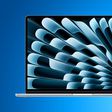Apple Claims Key Android Framework 'Inspired' by Andy Rubin's Work at Apple
 FOSS Patents reports on an interesting twist in Apple's case against HTC currently underway with the U.S. International Trade Commission. According to a recently-filed brief, Apple claims that a key patent for a "real-time signal processing" API which HTC is accused of infringing in its Android devices was developed by a team of Apple engineers, of which Android co-founder and current Google executive Andy Rubin was a member.
FOSS Patents reports on an interesting twist in Apple's case against HTC currently underway with the U.S. International Trade Commission. According to a recently-filed brief, Apple claims that a key patent for a "real-time signal processing" API which HTC is accused of infringing in its Android devices was developed by a team of Apple engineers, of which Android co-founder and current Google executive Andy Rubin was a member.
While the revelation is not directly relevant to Apple's case against HTC , the claim is provided primarily to bolster Apple's case that HTC has not been entirely truthful in presenting its case by omitting discussion of Rubin's time at Apple. According to Apple, Rubin was a "low-level engineer" at Apple reporting directly to the inventors of the patent in question at the time the invention. Apple suggests that Android's alleged infringing framework was the result of "Mr. Rubin's inspiration" from that work at Apple. From the legal brief:
Android and Mr. Rubin's relevant background does not start, as HTC would like the Commission to believe, with his work at General Magic or Danger in the mid-1990s. In reality, as the evidence revealed at the hearing, Mr. Rubin began his career at Apple in the early 1990s and worked as a low-level engineer specifically reporting to the inventors of the '263 [realtime API] patent at the exact time their invention was being conceived and developed. [...] It is thus no wonder that the infringing Android platform used the claimed subsystem approach of the '263 patent that allows for flexibility of design and enables the platform to be "highly customizable and expandable" as HTC touts. [...] While Mr. Rubin's inspiration for the Android framework may not be directly relevant to the pending petitions for review, that HTC felt compelled to distort this history is illustrative of the liberties it takes in attacking the ALJ's [initial determination] and the substantial evidence supporting the ALJ's findings.
Apple is of course not claiming that the entire basis of Android was actually developed at Apple, but its assertion that Rubin may have utilized some of Apple's work within Android could be problematic for Google should Apple decide to press a case directly against Google.
Rubin's behavior has already been called into question in a separate case brought by Oracle over the use of Java in Android. In that case, evidence in the form of an email written by Rubin in which he suggested that Google could use Java within Android without permission from Sun (now a part Oracle) has been introduced, leading to accusations of "willful infringement" against Rubin and Google. It seems that Apple may be at least planting the seed that Rubin could have engaged in similar activity dating back to his time at Apple twenty years ago.
Popular Stories
Apple is not expected to release a standard iPhone 18 model this year, according to a growing number of reports that suggest the company is planning a significant change to its long-standing annual iPhone launch cycle.
Despite the immense success of the iPhone 17 in 2025, the iPhone 18 is not expected to arrive until the spring of 2027, leaving the iPhone 17 in the lineup as the latest...
Language learning app Duolingo has apparently been using the iPhone's Live Activity feature to display ads on the Lock Screen and the Dynamic Island, which violates Apple's design guidelines.
According to multiple reports on Reddit, the Duolingo app has been displaying an ad for a "Super offer," which is Duolingo's paid subscription option.
Apple's guidelines for Live Activity state that...
The company behind the BlackBerry-like Clicks Keyboard accessory for the iPhone today unveiled a new Android 16 smartphone called the Clicks Communicator.
The purpose-built device is designed to be used as a second phone alongside your iPhone, with the intended focus being communication over content consumption. It runs a custom Android launcher that offers a curated selection of messaging...
Apple is planning to release a low-cost MacBook in 2026, which will apparently compete with more affordable Chromebooks and Windows PCs. Apple's most affordable Mac right now is the $999 MacBook Air, and the upcoming low-cost MacBook is expected to be cheaper. Here's what we know about the low-cost MacBook so far.
Size
Rumors suggest the low-cost MacBook will have a display that's around 13 ...
Apple plans to introduce a 12.9-inch MacBook in spring 2026, according to TrendForce.
In a press release this week, the Taiwanese research firm said this MacBook will be aimed at the entry-level to mid-range market, with "competitive pricing."
TrendForce did not share any further details about this MacBook, but the information that it shared lines up with several rumors about a more...
Apple today announced a number of updates to Apple Fitness+ and activity with the Apple Watch.
The key announcements include:
New Year limited-edition award: Users can win the award by closing all three Activity Rings for seven days in a row in January.
"Quit Quitting" Strava challenge: Available in Strava throughout January, users who log 12 workouts anytime in the month will win an ...
Govee today introduced three new HomeKit-compatible lighting products, including the Govee Floor Lamp 3, the Govee Ceiling Light Ultra, and the Govee Sky Ceiling Light.
The Govee Floor Lamp 3 is the successor to the Floor Lamp 2, and it offers Matter integration with the option to connect to HomeKit. The Floor Lamp 3 offers an upgraded LuminBlend+ lighting system that can reproduce 281...
Belkin today announced a range of new charging and connectivity accessories at CES 2026, expanding its portfolio of products aimed at Apple device users.
UltraCharge Pro Power Bank 10K with Magnetic Ring
The lineup includes new Qi2 and Qi2.2 wireless chargers, magnetic power banks, a high-capacity laptop battery, and USB-C productivity accessories, with an emphasis on higher charging...
 FOSS Patents reports on an interesting twist in Apple's case against HTC currently underway with the U.S. International Trade Commission. According to a recently-filed brief, Apple claims that a key patent for a "real-time signal processing" API which HTC is accused of infringing in its Android devices was developed by a team of Apple engineers, of which Android co-founder and current Google executive Andy Rubin was a member.
FOSS Patents reports on an interesting twist in Apple's case against HTC currently underway with the U.S. International Trade Commission. According to a recently-filed brief, Apple claims that a key patent for a "real-time signal processing" API which HTC is accused of infringing in its Android devices was developed by a team of Apple engineers, of which Android co-founder and current Google executive Andy Rubin was a member.























